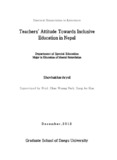Please use this identifier to cite or link to this item:
http://archive.nnl.gov.np:8080/handle/123456789/39| Title: | Teachers’ attitude towards inclusive education in Nepal |
| Authors: | Aryal, Shovhakhar |
| Keywords: | Teachers -- Nepal Inclusive education -- Nepal |
| Issue Date: | 5-Dec-2017 |
| Abstract: | Grounded in Positioning Theory this study was conducted to examine general & special education teachers’attitude towards inclusion of children with disabilities into the regular education classrooms in Nepal. A total number of 160 inservice teachers from 12 public schools and 16 private schools participated in this study. The participants were selected from urban and rural area of Nepal. The survey research study was based on self-rated questionnaires of 5 point Likert scale that were distributed to participating teachers. Descriptive statistics was utilized to analyze quantitative data by the means of percentage, mean, standard deviation, t-test and ANOVA and multiple comparisons by Scheffe. The major findings of study reveal that both general and special education teachers are found to have positive attitudes regarding inclusion for students with disabilities. More specifically, the study investigated significant influences of factors such as teacher type, age, gender, education levels, coursework, and residence on teachers’ attitudes about inclusive education. The present study has its implications for teachers, parents, administrators or policy makers and government, since the results of this investigation are significant in the sense that the understanding of educators’attitude is significant for the successful implementation of inclusion. It has also been found from the research study that there is still need to develop awareness about inclusive education among general education teachers and teachers be-longing to rural origin as they revealed less positive attitude towards -vinclusive education than the special education teachers & urban counterparts. In the scenario of Nepal, the challenge of addressing diverse needs of learners through inclusive education policy and instructional practice seem to be a great concern reflected in the attitude of teachers. The results of this study suggests at both personal and institutional levels, to providing clearly constructed inclusive education policies and approaches, and making adequate resources available appear to be the primary issues for moving forward with full inclusion initiatives. It is anticipated that inclusion will become more prevalent in classrooms over a few years as a result of teachers’acceptance of inclusion for people with disabilities. |
| Description: | In partial fulfillment of the requirements for the Degree of Doctor of Literature Department of Special Education, Major in Education of Mental Retardation, Graduate School of Daegu University, 2013. |
| URI: | http://103.69.125.248:8080/xmlui/handle/123456789/39 |
| Appears in Collections: | 300 Social sciences |
Files in This Item:
| File | Description | Size | Format | |
|---|---|---|---|---|
| Shovakar (Ph.D Thesis).pdf | 1.33 MB | Adobe PDF |  View/Open |
Items in DSpace are protected by copyright, with all rights reserved, unless otherwise indicated.